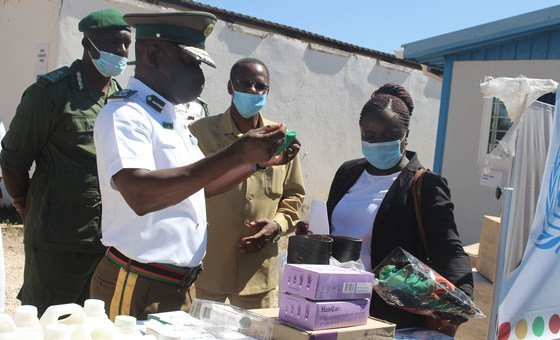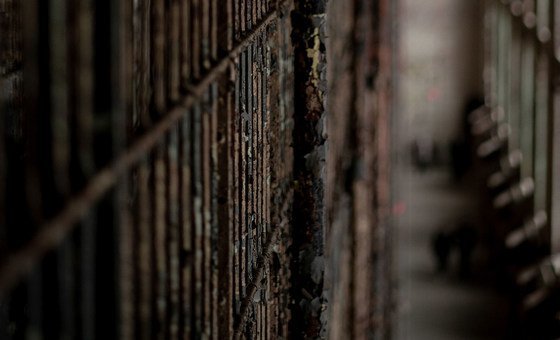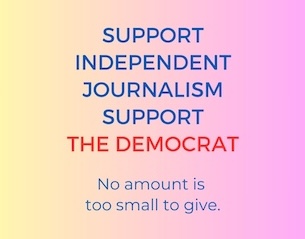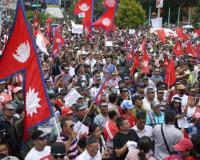- World
- Impact of COVID-19 ‘heavily felt’ by prisoners globally: UN expert
Impact of COVID-19 ‘heavily felt’ by prisoners globally: UN expert
On Wednesday, the impact of the virus in prison settings is being discussed at the 14th UN Congress on Crime Prevention and Criminal Justice which is underway in Kyoto, Japan. Philipp Meissner is a prison reform expert at the UN Office on Drugs and Crime (UNODC). UN News spoke to him ahead of the event

On Wednesday, the impact of the virus in prison settings is being discussed at the 14th UN Congress on Crime Prevention and Criminal Justice which is underway in Kyoto, Japan.
Philipp Meissner is a prison reform expert at the UN Office on Drugs and Crime (UNODC). UN News spoke to him ahead of the event in which he is participating.

UNODC
Philipp Meissner, Prison Reform Focal Point in the UN Office on Drugs and Crime (UNODC).
How badly are prisoners around the world being affected by COVID-19?
Prison systems and the more than 11 million prisoners worldwide have been disproportionately affected by COVID-19. It’s estimated there are more than 527,000 prisoners who have become infected with the virus in 122 countries with more than 3,800 fatalities in 47 countries.
With limited testing capacity in many jurisdictions and the rapidly evolving situation, the actual number may be much higher. It should also be recognized that due to their close and regular interaction with prisoners, prison officers, health-care professionals and others working in prisons, also face an enhanced risk of infection. Undoubtedly, prisons are high-risk environments for COVID-19 for those who live and work there.
Where are prisoners suffering most?
The impact is heavily felt by prisoners in the majority of countries on all continents. Even relatively well-resourced penal systems face serious challenges in mitigating the impact of the pandemic in prisons. The consequences are particularly severe in prison systems that have been over-stretched to start with, including due to systemic neglect, a lack of staffing and other resources. That has led to poor prison conditions, for example insufficient sanitation, hygiene and health services.
Prison overcrowding, which continues to affect a majority of countries worldwide, exponentially increases the challenges posed by COVID-19 and the actual feasibility of introducing meaningful infection prevention and control measures.
What difficulties do national authorities face in fighting the pandemic in prison settings?
Already prior to the pandemic, many prison systems struggled to even cater for the basic needs of prisoners and ensure prison health. Sufficient space, nutrition and drinking water, access to sanitary items and decent sanitary facilities as well as proper ventilation in accommodation and working areas, are not a given in many prisons around the world. And access to personal protective equipment (PPE), infrared thermometers or testing capacities specific to COVID-19 is challenging.

Personal protective equipment supplies are received at a prison in Zambia. UNODC
These factors are aggravated by the typically weaker health profile of prison populations, including a higher prevalence of both communicable and non-communicable diseases.
The principle of equivalence of care, which should provide prisoners with access to health services free of charge and of a similar standard as provided in the community, is not ensured in many countries. It is also crucial that international standards, in particular, the UN Standard Minimum Rules for the Treatment of Prisoners, the so-called Nelson Mandela Rules, are adhered to.
The atmosphere in prisons has become tense in many countries, further nurtured by anxieties, fears and uncertainties amongst both prisoners and prison officials. Prison riots and other security incidents in around 50 countries have showcased the importance of communicating around COVID-19 in a transparent manner and, as much as possible, with the active involvement of prisoners.
The measures adopted in many countries have typically resulted in the further tightening of prison regimes, including the suspension of visits as well as very restricted access, if at all, to rehabilitation programmes and other constructive activities outside of accommodation areas.
Not being able to see families and children over extended periods of time, has a serious impact on the mental health and well-being of prisoners, including incarcerated mothers and fathers, and significantly aggravates the suffering inherent in a situation of imprisonment.

Prisoners incarcerated in under-resourced facilities can face particularly poor conditions. (file), Unsplash/R.D. Smith
Is enough attention being paid by national authorities to the plight of prisoners during the pandemic?
Prison management and services are a weak link in the criminal justice systems in many countries. Prisoners constitute a segment of society which is easily forgotten by policymakers and the general public alike.
From the outset of the pandemic, UNODC and others have been very vocal about the need to firmly embed prisons, prisoners and prison personnel into the overall COVID-19 public health response of countries. While many jurisdictions are heeding these calls and have engaged in commendable efforts, more needs to be done to fully address the plight of prisoners during the pandemic and to mitigate the risk of COVID-19 in prisons; that should include vaccination programmes.
What solutions are being found to stopping the spread of the virus in prisons?
One of the key issues for prisons is severe overcrowding and so many countries have sought to curb the continuous inflow of prisoners; for example by issuing suspended sentences for less serious crimes and by engaging in the emergency release of prisoners, in particular those who are at risk or near the end of their sentences.
It’s estimated that more than 700,000 prisoners have been authorized for release globally during the pandemic.
How can the UN support improved prevention measures in prisons globally?
The United Nations is advocating for holistic prison reform as well as a reexamination of the current scope of imprisonment with a view to addressing over-incarceration and prison overcrowding.
Specifically, UNODC has engaged with national prison and correctional services from more than 50 countries to assist in enhancing measures to prevent and control infections, to ensure continued adherence to minimum prison standards, as well as to promote, in suitable cases, an increased use of alternatives to imprisonment.
UNODC’s global support has included:
• In Uganda, 16 water tanks, 40 hospital beds, soap, several thousand mattresses and blankets were procured to enhance COVID-19 preparedness. Video conferencing equipment was supplied to accelerate case management through virtual court hearings. Prisoners also benefitted from additional mobile airtime to maintain contact with their families as well as post-release support.
• Similar initiatives are ongoing in Kenya, Somalia and several countries in Southern Africa. In Malawi, prisoner accommodation areas were renovated to improve ventilation and access to water.
• Support has also been provided to countries in the Sahel region, including medical equipment for prison infirmaries in Mauritania.
• In Bolivia, Lebanon, Myanmar, the Philippines, Sri Lanka, Somalia and Zambia and other countries, UNODC provided prison authorities with urgently needed PPE including infrared thermometers, face masks, gowns, gloves, and hand sanitizers.
• UNODC continues to conduct webinars and on-line training courses on COVID-19 prevention and responses in prisons in countries including Brazil, Egypt, Pakistan, Peru, the United Arab Emirates, Saudi-Arabia, as well as other countries in the Southern African, Eastern European and Central Asian regions.
• In Mauritania, a prison radio station will be set up with UNODC support in three prisons to provide regular information on COVID-19 awareness, hygiene and health.
• In Namibia, UNODC ensured the continued involvement of prisoners in constructive activities by supporting the adjustment of a vocational training workshop into a production line for soap and hand sanitizers with a view to bolstering prevention measures.











